5 Best Workouts To Slow Muscle Aging
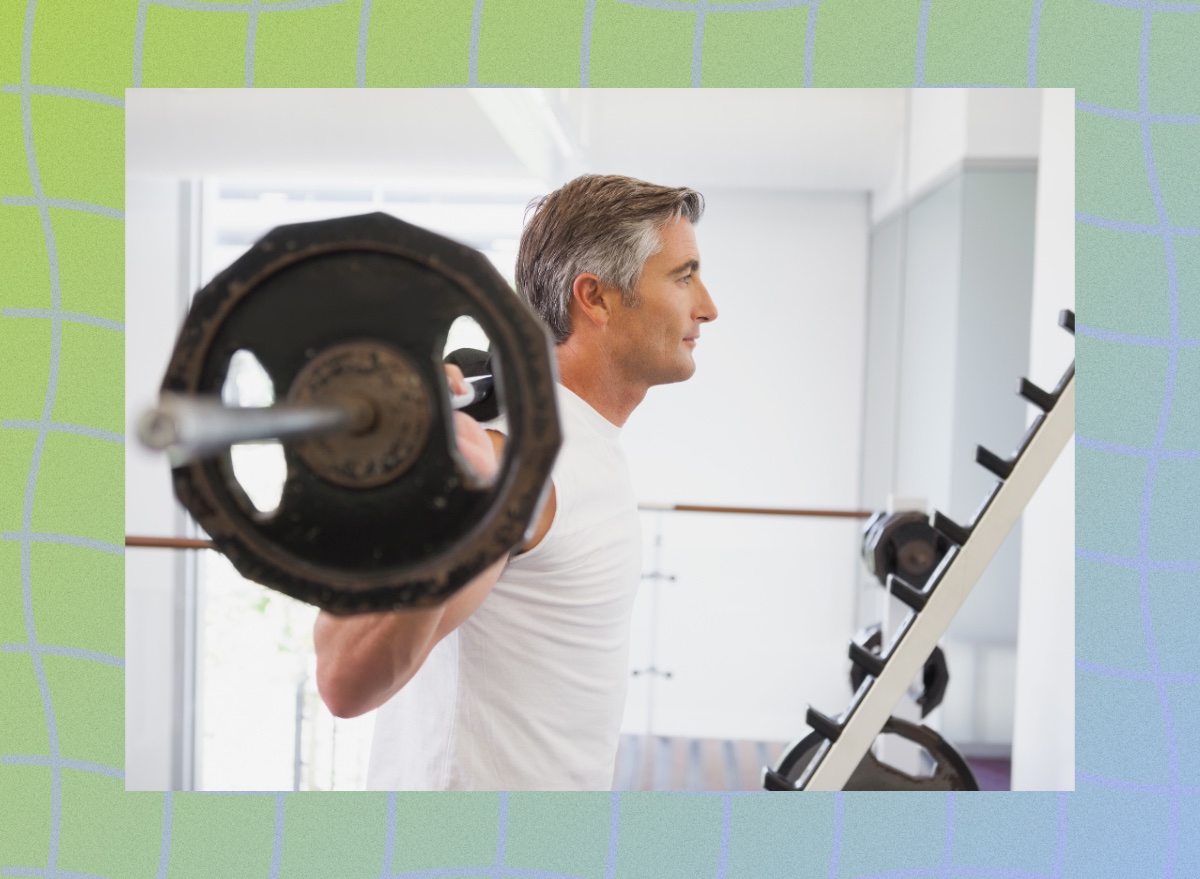
Maintaining muscle mass and strength becomes crucial for overall health and longevity as we age. Research shows that muscle aging, characterized by the gradual loss of muscle mass and function, can lead to decreased mobility, increased risk of injury, and a decline in quality of life. However, you can address this natural process with the right workouts to slow muscle aging and keep your muscles strong and resilient. Whether you're in your 30s, 50s, or beyond, incorporating targeted exercises into your routine can help you age gracefully and stay active.
Lucky for you, I've developed five of the best workouts to slow muscle aging. These workouts are designed to build and maintain muscle strength, improve balance and coordination, and boost overall fitness. Each of these workouts focuses on different aspects of fitness, from strength training to aerobic conditioning, ensuring a well-rounded approach to muscle maintenance.
Ready to take control of your aging process and build a stronger, healthier body? Let's dive into these powerful workouts to combat muscle aging.
Workout #1: Full-body Dumbbell Workout
1. Dumbbell Deadlifts
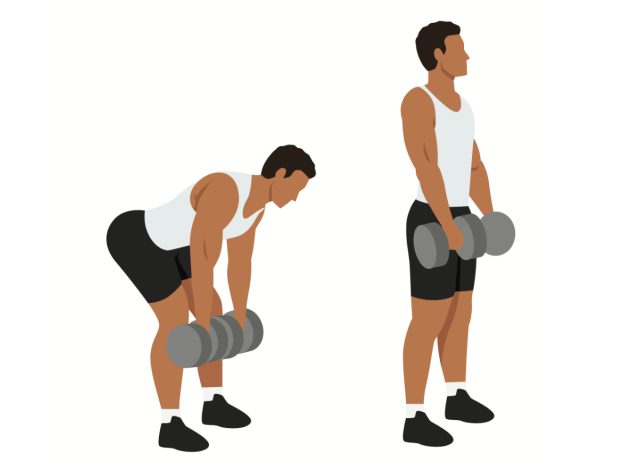
Dumbbell deadlifts are excellent for building lower-body strength and enhancing muscle endurance, which are vital for slowing muscle aging. This exercise targets the glutes, hamstrings, and lower back, helping to improve posture and stability.
Stand with your feet hip-width apart, holding a dumbbell in each hand before your thighs. Hinge at the hips, keeping your back straight and knees slightly bent, and lower the dumbbells toward the floor. Engage your glutes and hamstrings to lift the dumbbells back to the starting position, keeping them close to your body.
Perform three sets of eight to 12 reps, with a ninety-second rest period between sets.
2. Seated Shoulder Press
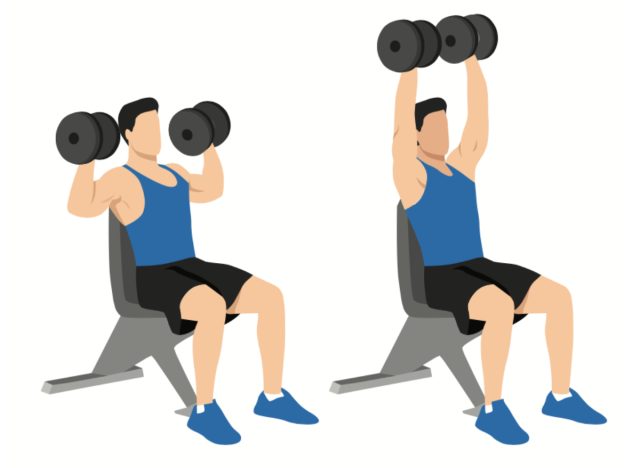
The seated shoulder press strengthens the shoulders and upper arms, which is crucial for maintaining upper-body strength as you age. This exercise also helps improve functional movements and upper body endurance.
Sit on a bench with a backrest, holding a dumbbell in each hand at shoulder height. Press the dumbbells overhead until your arms are fully extended. Lower the dumbbells back to shoulder height in a controlled manner.
Complete three sets of eight to 10 reps, with a 90-second rest period between sets.
3. Single-arm Suitcase Carry
The single-arm suitcase carry is a great exercise for improving grip strength, core stability, and overall functional strength, which are essential for daily activities and reduce the risk of falls.
Stand upright, holding a heavy dumbbell in one hand by your side. Walk forward, keeping your shoulders level and core engaged. After walking a set distance, switch the dumbbell to the other hand and repeat.
Perform three sets of 30 to 60 seconds per side, with a 90-second rest period between sets.
Workout #2: Full-body Bodyweight Workout
1. Pushups
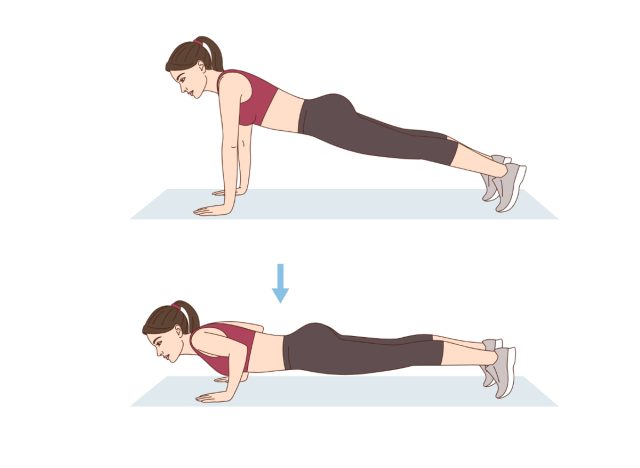
Pushups are a classic bodyweight exercise that builds upper-body strength, targeting the chest, shoulders, and triceps. They also engage the core, making them a well-rounded exercise for slowing muscle aging.
Start in a plank position with your hands slightly wider than shoulder-width apart. Lower your body until your chest nearly touches the floor. Push back up to the starting position, keeping your body in a straight line throughout.
Complete three sets of 10-15 reps, with a 90-second rest period between sets.
2. Heel-elevated Hip Thrust
Heel-elevated hip thrusts focus on the glutes and hamstrings, which are essential for maintaining lower-body strength and stability as you age. This exercise also helps improve hip mobility.
Sit on the ground with your heels elevated on a raised surface. Drive your hips upward by squeezing your glutes and pushing through your heels. Lower your hips back to the starting position.
Perform three sets of 12 to 15 reps, with a 90-second rest period between sets.
3. Plank with Shoulder Taps
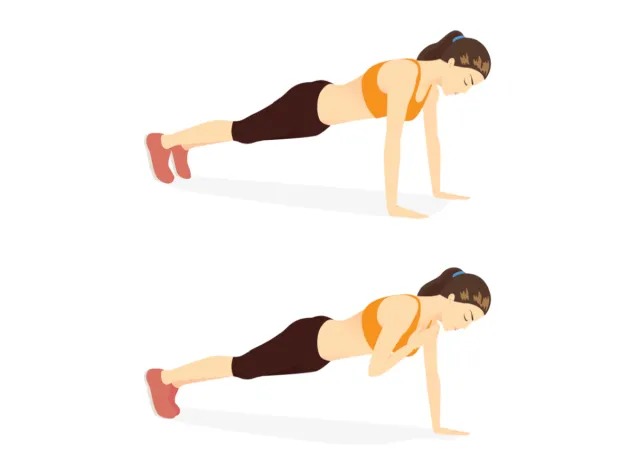
Plank with shoulder taps enhances core stability and strength, which are critical for preventing back pain and improving overall functional fitness.
Start in a plank position with your hands directly under your shoulders. Lift one hand and tap the opposite shoulder, keeping your hips stable. Alternate sides, tapping each shoulder.
Complete three sets of 20 taps (10 per side), with a 90-second rest period between sets.
Workout #3: Aerobic Intervals
1. Jumping Jacks
Jumping jacks are a full-body aerobic exercise that increases heart rate, improves cardiovascular health, and engages various muscle groups, making them great for overall fitness.
Stand with your feet together and hands at your sides. Jump your feet out to the sides while raising your arms overhead. Jump back to the starting position.
Perform three rounds of 30 to 45 seconds, with 60 seconds of rest between rounds.
2. Lateral Shuffles
Lateral shuffles improve agility, coordination, and lower-body strength, which are important for maintaining balance and preventing falls.
Stand with your feet hip-width apart, knees slightly bent. Quickly shuffle to one side for a set distance. Reverse direction and shuffle back to the starting point.
Complete three rounds of 30 to 45 seconds, with 60 seconds of rest between rounds.
3. Mountain Climbers
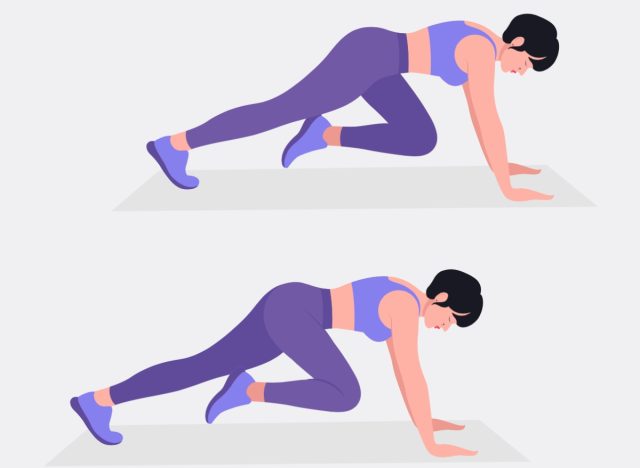
Mountain climbers are a dynamic exercise that strengthens the core, shoulders, and legs while providing a cardiovascular workout.
Start in a plank position with your hands under your shoulders. Drive one knee toward your chest, then quickly switch legs, mimicking a running motion.
Perform three rounds of 30 to 45 seconds, with 60 seconds of rest between rounds.
Workout #4: Core-focused Circuit
1. Dead Bugs
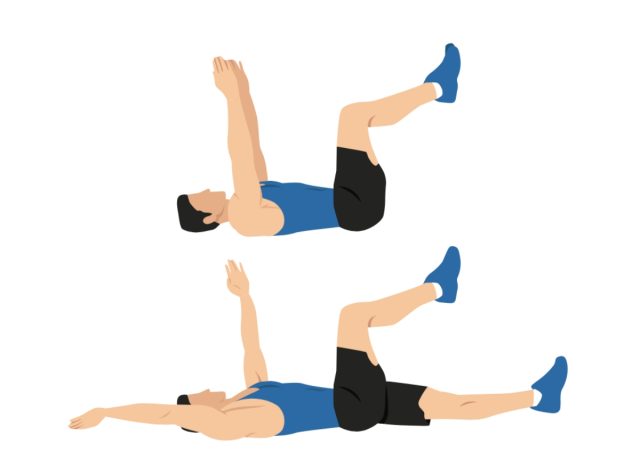
Dead bugs target the core muscles, enhancing stability and strength, which are essential for protecting the spine and maintaining good posture.
Lie on your back with your arms extended toward the ceiling and knees bent at 90 degrees. Lower your right arm and left leg toward the floor simultaneously, keeping your lower back pressed into the ground. Return to the starting position and repeat on the opposite side.
Complete three sets of 10 to 12 reps per side, with a 60-second rest between sets
2. Plank with Pull-Through
This exercise challenges your core stability and engages the upper body, enhancing overall strength and coordination.
Start in a plank position with a dumbbell placed beside your right hand. Reach with your left hand to pull the dumbbell across to the left side. Alternate sides, pulling the dumbbell across with the opposite hand each time.
Perform three sets of 10 to 12 reps per side, with a 60-second rest between sets
3. Side Plank Holds
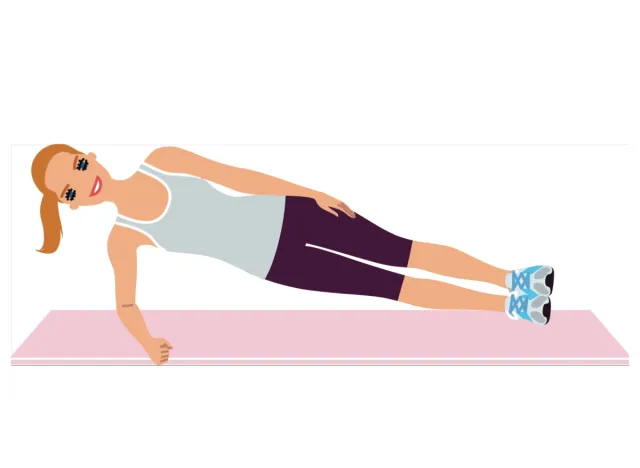
Side plank holds improve oblique strength and overall core stability, which is crucial for maintaining balance and reducing the risk of injury.
Lie on your side with your elbow directly under your shoulder and your legs stacked. Lift your hips to form a straight line from head to feet. Hold the position, keeping your core engaged.
Complete three sets of 20 to 30 seconds per side, with a 60-second rest between sets.
Workout #5: Full-Body Barbell Workout
1. Back Squats
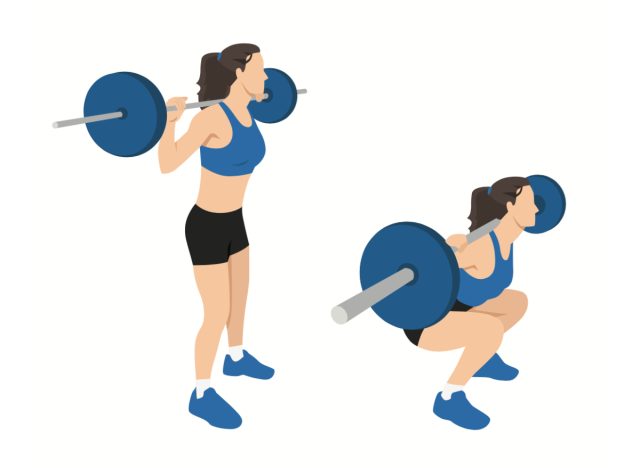
Back squats are fundamental for building lower-body strength, targeting the quads, hamstrings, and glutes, which are essential for maintaining muscle mass as you age.
Place a barbell on your upper back and stand with your feet shoulder-width apart. Lower your body by bending your knees and hips, keeping your back straight. Push through your heels to return to the starting position.
Perform three sets of six to eight reps, with a two-minute rest period between sets.
2. Bent-Over Row
Bent-over rows strengthen the back muscles, improving posture and upper-body strength, which are crucial for preventing muscle loss and maintaining functional fitness.
Stand with your feet shoulder-width apart, holding a barbell with an overhand grip. Bend at the hips until your torso is nearly parallel to the floor. Pull the barbell toward your abdomen, squeezing your shoulder blades together.
Complete three sets of eight to 12 reps, with a two-minute rest period between sets.
3. Glute Bridge
Glute bridges target the glutes and hamstrings, helping to maintain lower-body strength and improve hip mobility, which is important for daily activities and overall functional fitness.
Lie on your back with your knees bent and feet flat on the floor, holding a barbell across your hips. Lift your hips by squeezing your glutes, forming a straight line from your shoulders to your knees. Lower your hips back to the starting position.
Perform three sets of 12 to 15 reps, with a two-minute rest period between sets.









